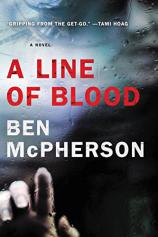A Line of Blood
Review
A Line of Blood
A LINE OF BLOOD, Ben McPherson’s debut novel, is a slow-burning crime thriller about a family in crisis. While the unhealthy dynamic of the Mercer family has been simmering for years, things boil over when Alex and his 11-year-old son, Max, find their neighbor dead of an apparent suicide. The neighbor, a man named Bryce, is someone Alex didn't know. But as the details of Bryce's death unfold, it seems that both his wife and son knew him all too well.
When Alex learns that his wife, Millicent, was having an affair with Bryce, and that his son knew about it, all the barely suppressed tensions among the three erupt. Alex is concerned about Max having both seen the neighbor's body and witnessed his wife's affair, but Max seems to be responding with a frightening and strange coldness. The relationship between Alex and Millicent begins to disintegrate, and old wounds are opened up again, especially the pain associated with the loss of their unborn daughter several years prior. They move from sadness and intimacy to anger and even violence page by page.
"McPherson always keeps his focus on the domestic drama of this damaged family and manages to deliver an unsettling resolution that will have readers thinking about responsibility, justice and the strength of family ties."
As the Mercer family falls apart, the police continue the investigation into Bryce's death, which is now classified as a murder, not a suicide. As Alex is questioned regarding the crime, he begins to suspect that Millicent is the guilty party. While the story is told from Alex's first-person perspective, readers may find themselves doubting him and his innocence. The secrets kept by Alex, Millicent and Max, as well as their irrational behavior, mean that the reader is dealing with three unreliable characters while trying to sort out the mystery. The details of the murder and the clues as to the identity of the killer are intriguing, especially Max's graphic and gruesome notebook, but are secondary to the themes of grief, attraction, anger, loss and forgiveness.
A LINE OF BLOOD is heavy on dialogue, driven not by action but by the conversations the characters have about the action. The strained relationships of the Mercer family are expressed as the characters talk about or, more often than not, around their feelings. Alex and Millicent swing wildly from emotion to emotion as Max stews in a pathological hatred of his mother. The emotions and reactions of the family, to each other and to the situation, don't always make sense. Alex and Millicent spend much time apart and away from Max, even though they are all struggling and he is very young. The conversations are often circular and repetitive, but it may be the kind of realism that McPherson was going for.
One interesting theme here is that of place: the Mercers live in a London neighborhood unaffectionately known as Crappy and toy with the idea of escaping to Norway. Their gritty reality, one that they once found romantic, is contrasted with a distant place that holds the possibility of a fresh and bright start.
By the end, readers won't be surprised by the identity of the murderer, but that doesn't mean that A LINE OF BLOOD doesn't pack a punch. McPherson always keeps his focus on the domestic drama of this damaged family and manages to deliver an unsettling resolution that will have readers thinking about responsibility, justice and the strength of family ties.
Reviewed by Sarah Rachel Egelman on October 2, 2015





